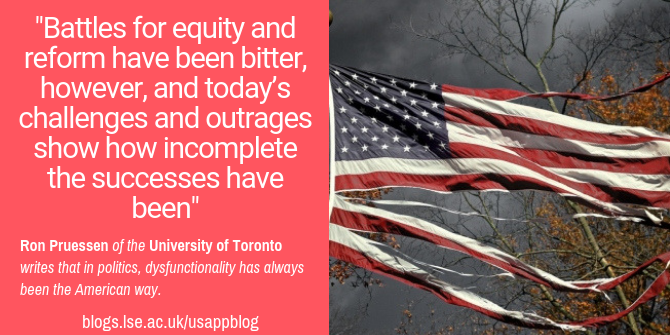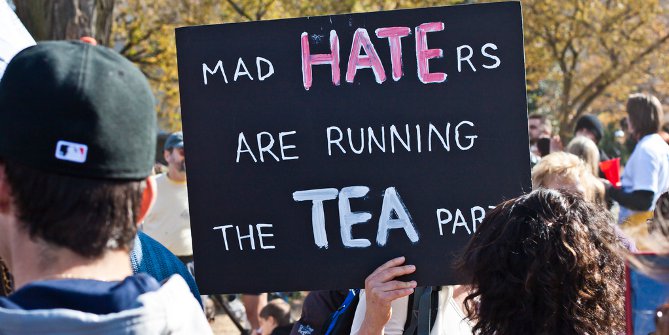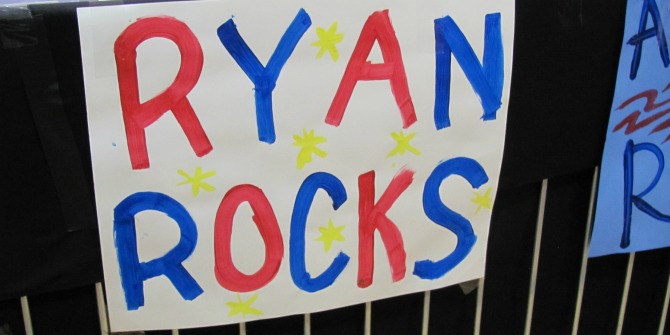 “Dysfunctional” has become an inescapable adjective in discussions of American government in the Age of Trump – for good reason. Ron Pruessen suggests that dysfunctionality has deep roots in American history. As both an operational reality and an often-unappreciated intellectual current, it has staying power that will still be in play when a 46th president (hopefully sooner, perhaps later) replaces the current occupant of the White House.
“Dysfunctional” has become an inescapable adjective in discussions of American government in the Age of Trump – for good reason. Ron Pruessen suggests that dysfunctionality has deep roots in American history. As both an operational reality and an often-unappreciated intellectual current, it has staying power that will still be in play when a 46th president (hopefully sooner, perhaps later) replaces the current occupant of the White House.
“We may indeed with propriety be said to have reached almost the last stage of national humiliation. There is scarcely any thing that can wound the pride or degrade the character of an independent nation which we do not experience.” There’s more than a hint of 2019 in these words, isn’t there – even if the syntax has the ring of another time? (Who refers to “propriety” today, even as we’re smacked by its absence in the age of Trump?) Alexander Hamilton wrote the words in 1787, including them in one of the Federalist papers rallying support for the draft Constitution then being hotly debated. Thanks to the recent (and longest) government shut-down in US history and the follow-on declaration of a “national emergency” that will segue into a Congressional cacophony and a spate of court challenges, the twenty-three decades that have passed keep the words as fresh as Lin Manuel Miranda’s in his musical Hamilton.
All the more so, of course, because of so many other things that have happened since 2016: Trump’s Tweedle-dumb/Tweedle-me zaniness and Republican/religious right enabling, for example, conspiring (colluding?) to prevent meaningful solutions to profound problems involving immigration, gun control, opioids, and economic inequality (among too many others). Democratic control of the House now promises new variables on the same basic pattern – with the media virtually salivating over a Pelosi-Trump cage match, for instance. We opt for the adjective “dysfunctional” to capture the essence of this predicament; Hamilton called his tally of the problems of the 1780s a “dark catalogue”: both descriptions work.
There are complexities in the shutdown drama and its prequel/sequel that are not always apparent as worried sighs are heaved. I’ll mention three here:
First, Trump has ushered in new heights (or depths) of dysfunctionality – he may brag about that one of these days – but it was already evident under his predecessors. Bitter partisanship (especially Republican obstructionism during the Obama years) kept Congress from any action or any fully effective action on issues still hanging fire in 2019. When there was movement, it often produced either limited or fragile results – as with the economic recovery/financial regulation efforts of 2009-10 or health care reform.
Second, early 21st century government unworkability that precedes Trump is only the latest manifestation of a pattern that stretches back across two and a half centuries. The United States has spun in circles, stumbled, and even fallen on quite a few occasions in its history. Hamilton’s, James Madison’s, and John Jay’s Federalist papers emerged because government under the Articles of Confederation was seen as – yes – dysfunctional. In the 1850s, Americans and their political leaders proved tragically unable to deal with the chasms that opened because of slavery and other regional tensions – with the Civil War surely the worst example of dysfunction in the country’s experience (to date). The Great Depression – despite our quasi-mythological perceptions of the New Deal – saw Franklin D. Roosevelt increasingly roadblocked after 1936. Problems with Republicans, conservative Democrats, and the courts (among other things) led to FDR’s unsuccessful attempt to add more justices to the Supreme Court as well as the snail’s pace of reform efforts that characterized his second term. The paucity of movement helped make World War II the ultimate rescuer of the country’s severely wounded economy.

“Tattered” by John M. Cropper is licensed under CC BY NC 2.0
Dysfunctionality, then, is something of a tradition in the United States. If not a constant feature of government, it makes regular appearances. This suggests a third complexity that deserves attention in 2019: large numbers of Americans have chosen government ineffectiveness – and continue to do so. Given frequent complaints about neglected problems and excessive partisanship, this may seem a dubious observation. It is comparable, though, to the relationship between the public’s condemnation of dirty, negative campaigning and its voracious appetite for slime and gladiatorial blood. Voters and leaders are conflicted, in other words, prompted in the case of hamstrung government by attitudes that go back to the colonial era and the dawn of the Republic. James Madison wanted the Constitution (as did Hamilton), but he wanted it complete with the famous “checks and balances” that are a crucial taproot of dysfunctionality. Fear of mobs, suspicions of demagogues and autocrats, attraction to “rugged individualism” and “self-reliance” – and antipathy to tax burdens: all have remained potent through the centuries. The Jeffersonian belief that the “government which governs best governs least” segued into laissez faire enthusiasm in the late 19th century and then into variations on anti-socialist and neo-con/neo-liberal “market” mantras of the 20th.
There have been countervailing beliefs, of course, which have seen what some (myself included) would praise as the productive mobilization of government activism. On issues involving economic rights, race, and gender, as a result, the US of the 21st century is far better than Hamilton’s or the Robber Barons’ of the late 19th century. Battles for equity and reform have been bitter, however, and today’s challenges and outrages show how incomplete the successes have been. As the struggles continue, the depth and complexity of their roots should be kept in mind. This will help make it clear that Donald Trump is a proverbial iceberg’s tip in the American political saga – albeit a particularly bizarre and stomach-churning tip.
Hopes for Trump’s departure may materialize – through resignation, impeachment, or a failed re-election bid (to mention the most likely ways to skin this conniving Cheshire cat). If they do, however, Americans will still be left with daunting predicaments. At the least, Trump admirers and enablers will remain to be reckoned with – and to wreck, when opportunities and Supreme Court rulings emerge. More significantly – because of its long-haul relevance – those philosophically, ideologically, and viscerally resistant to government activism show no signs of abandoning the political arena for survivalist encampments in Montana or the back reaches of Trump golf courses. Liberals and radicals will have to go on engaging with conservatives and reactionaries (and each other). Any celebration of a White House cleansing will have to avoid euphoria in order to be more than momentary – and the celebrants should prepare themselves for serious and sustained participation in new rounds of deeply historic debates. For good and ill (and it’s both), it’s the American way.
Please read our comments policy before commenting.
Note: This article gives the views of the author, and not the position of USAPP – American Politics and Policy, nor of the London School of Economics.
Shortened URL for this post: http://bit.ly/2V6wedV
About the author
 Ron Pruessen – University of Toronto
Ron Pruessen – University of Toronto
Ronald W. Pruessen has served as the Munk School of Global Affairs’ Director for International Partnerships & Research and is former Chair of the Department of History, University of Toronto. His primary research and teaching interests are in 20th century US foreign policy and international relations. Early work focused on the Cold War (e.g., John Foster Dulles: To the Threshold, 1888-1952) and he recently co-edited (with Soraya Castro) Fifty Years of Revolution: Perspectives on Cuba, the United States, and the World. He is currently writing a study of the way Barack Obama’s foreign policies relate to deeply rooted American views and behavior.






